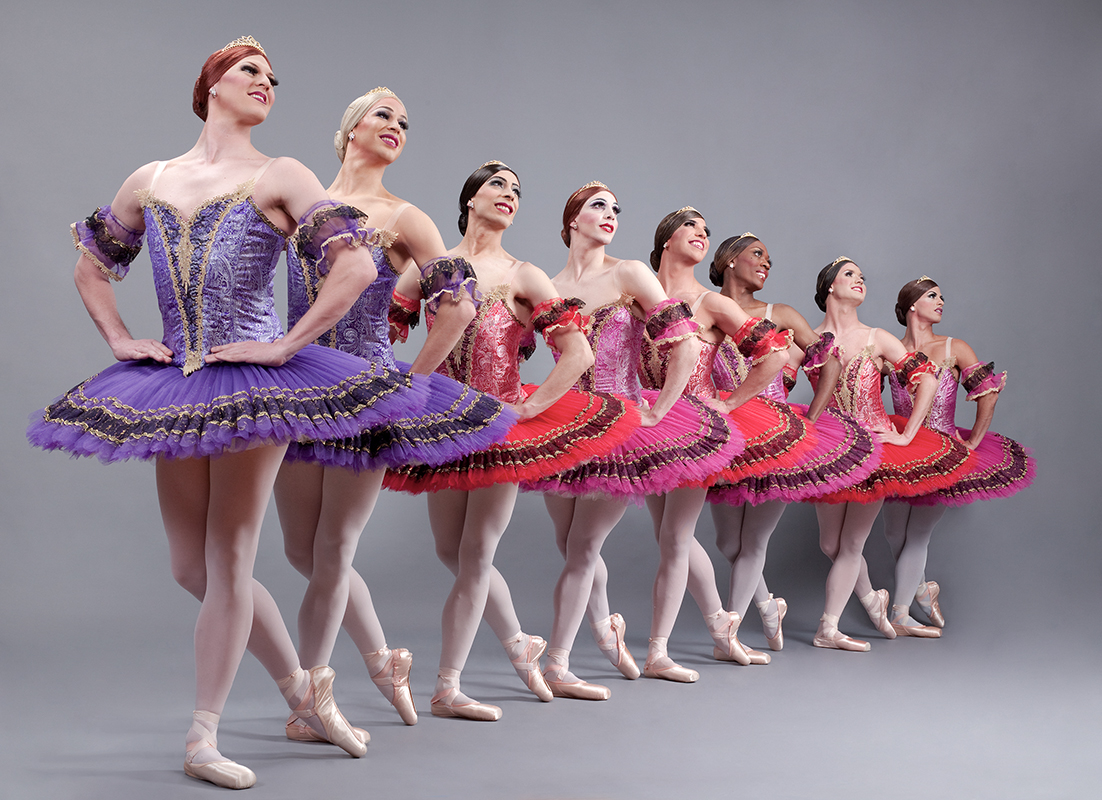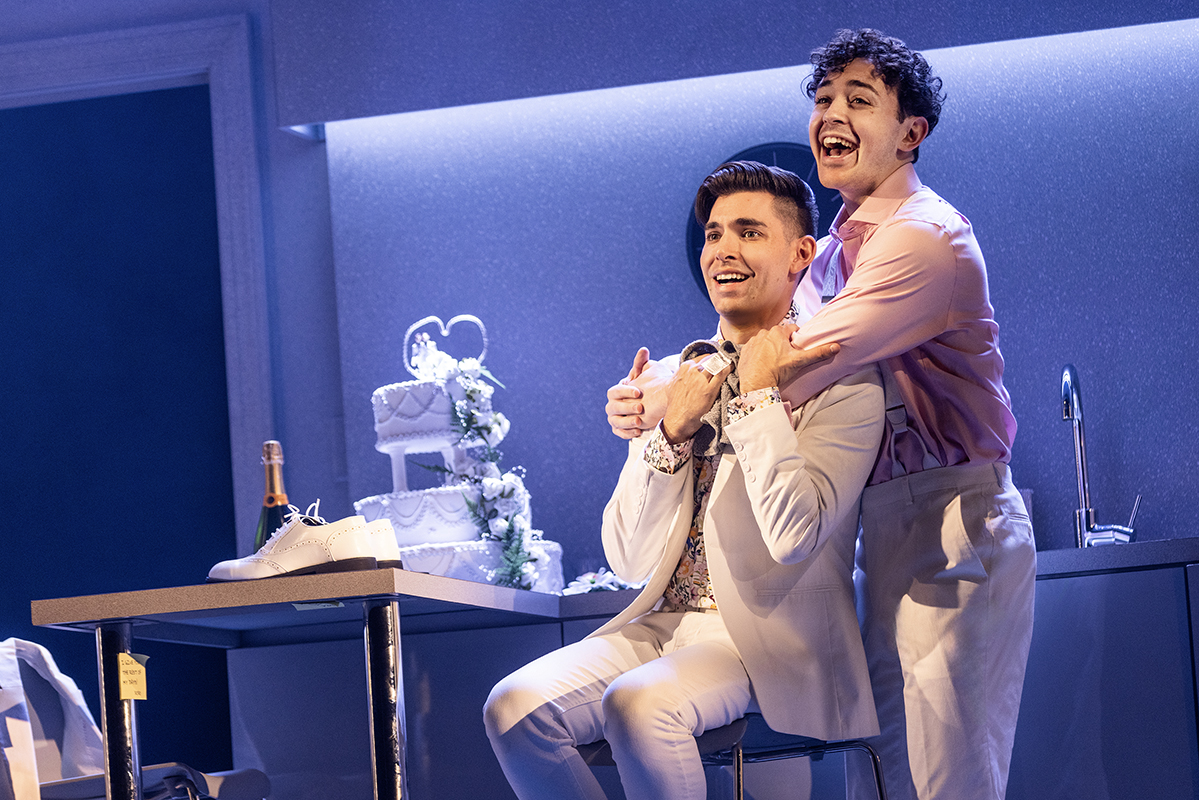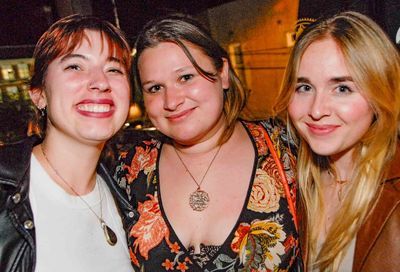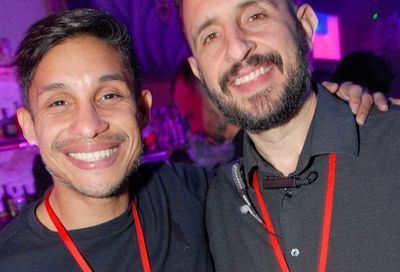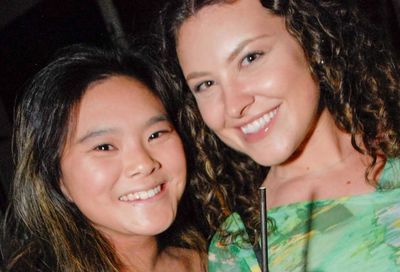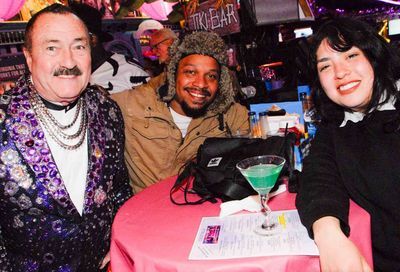Ring Master: Francesca Zambello
As head of The Washington Opera, Francesca Zambello strives to make the artform as accessible and relevant as possible. Including Wagner's Ring Cycle.

Sheepishly mention to Francesca Zambello that you’ve never seen an opera and, with a smile, she’ll issue a simple challenge: Watch Richard Wagner’s Ring Cycle.
In its entirety.
All 17 hours of it.
“Just try it,” the esteemed, abundantly-awarded artistic director of the Washington Opera says. “When people say they’ve never been to an opera, I say ‘If you don’t try it, you don’t know how great it is.’ It’s an amazing experience! Amazing! That acoustic sound of the orchestra and the voices — incredible.”
For those who don’t want to brave The Ring Cycle’s full running time, an epic, mythic tale spread out over four operas, Zambello recommends The Valkyrie, second in the cycle, as a standalone. “Its story stands on its own, so you could just see that.” Performed in German (with surtitles), The Valkyrie‘s universal, existential themes and enormous, overwhelming scale has the power to entrance novices and opera veterans alike. It boasts one of the most famous pieces of music in opera’s canon — “Ride of the Valkyries,” made instantly recognizable from its overuse by pop culture (everything from the chopper scene in Apocalypse Now to Elmer Fudd warbling “Kill the Wabbit”). The time commitment for The Valkyrie? “Four and a half hours, with two intermissions.”
Individual operas from The Ring Cycle, which starts a three-week run on Saturday, April 30 at the Kennedy Center, are often produced as standalones within an opera company’s season. It’s rare — and something of a significant cultural event (not to mention herculean undertaking) — when a company mounts all four of Wagner’s behemoths at once. But that was Zambello’s challenge to herself. It took a decade to fully realize, as production costs and schedules are often a determining factor. Yet Zambello stuck with the project, citing a “deep and passionate love for all things Ring.”
Raised in a family that valued music and the performing arts, Zambello was encouraged from an early age to appreciate opera. That encouragement, and the love it engendered, fueled her passion for the subject — as well as her conviction that newcomers, of any age, shouldn’t be intimidated by opera. Zambello is not — we repeat, not — an opera snob.
“My whole goal is to make it accessible,” she says. “I want to make opera for everyone.”
Zambello loves all styles of opera, though she clearly regards Wagner’s as a cut above the rest. Unlike the beautiful Italian operas, with crazy twists and romantic trysts, Wagner’s works are vigorous and somewhat more serious, focused on, as she puts it, “exploring the core of what it means to be human” — whether motivated by power, romance, or a sense of belonging. “We all know what it is to hunger for something,” she says during an hour-long interview in her Georgetown home. “And we’ve seen how desire can push people to do things they wouldn’t imagine themselves capable of.”
And then there’s Wagner’s music, which Zambello considers to be as primal as they come, to the point of being a potential aphrodisiac.
“It’s just some of the sexiest music ever written,” she says. “This is music to not just be romantic to, it’s music to have sex to! It’s so powerful. I strongly recommend it!”
METRO WEEKLY: What on earth inspired you to take on the entire Ring Cycle?
FRANCESCA ZAMBELLO: The Ring Cycle is the big chalice in our business. I think it’s the greatest set of operas ever written. It constantly speaks to us, through its themes and music and words. Why wouldn’t you want to do it? It’s like directing all of Shakespeare. It’s something that’s a real challenge, not just for the director, for everyone involved. It’s a unique and often life-changing experience. It’s so powerful — and it’s primal. The characters, their emotions, their story. When you hear this music everyday, day in and day out, it becomes like a drug. You get addicted. And I think audiences get addicted to it. That’s why there are people who travel the world just to see it. The same way people who have never seen it, and see it for the first time, are completely drawn to it.

MW: Can you give an overview of the opera and its four parts?
ZAMBELLO: The story, simply put, is about who has the ring. And the ring is the symbol of power and world domination. But it carries a curse — to make the ring work, you must renounce love. And what happens is, it starts by a character named Alberich, who is a dwarf. He steals the ring, the gold that makes the ring, from the Rhinemaidens — the River Maidens. And when he does that, he destroys the natural order. He breaks nature. It’s like, “Don’t screw with Mother Nature.” He sets off a cataclysmic cycle. The ring goes from him to a series of other people, who each believe that it will give them total power, but it destroys them. Eventually, a woman named Brunnhilde, who is the hero of The Ring Cycle, gets the ring back to the Rhinemaidens, and restores a kind of world harmony.
MW: Why has this production been christened The American Ring?
ZAMBELLO: The designers and I were in Washington — the center of power — and the piece is about how greed and the quest for power can destroy everyone, so it seemed kind of obvious. We used a lot of American visual context to tell the story. It’s not like it hits you over the head, as though it’s set in the suburbs in a gas station. It’s much more about the power of the natural world, America’s unspoiled, beautiful landscape in the 19th century. The way we do it, it moves forward through time, through the American Industrial Age to the great Robber Barons, then to World War II, then to the 1960s, where everything is falling apart, to a time that is slightly futuristic. It also draws on a lot of American films, like Citizen Kane — who is very much like the King of the Gods Wotan, who believes that he is untouchable. So it uses American myth, iconography, and a visual language to tell the story.
MW: What makes The Ring Cycle such a good work for interpretation?
ZAMBELLO: It’s always been interpreted. It’s like a mirror to the world. These themes of the environment and power — they’re universal and contemporary all at once. We think about the music all the time because the music is hypnotic. It uses an orchestra of 100 players, these voices that are sublime and huge, incredible melodies that wrap around you, and get inside of your ear.
Wagner invented something called leitmotif — he created a sound or a melody that represents a character or a feeling. And since the story is so complex, when you have that feeling or that character, you hear that music. And that just bores down inside of you. The orchestra is a huge protagonist in The Ring. Huge. And they keep answering and commenting and telling the story.
MW: What was the very first opera you ever saw?
ZAMBELLO: Madama Butterfly. My father brought me to it. I don’t know if I loved it, but I was curious. I was probably six or seven.
MW: What, then, was the first opera that you loved?
ZAMBELLO: Probably Mozart, when I was a teenager. Just the sounds and the beauty and the symmetry of the music. It was very contagious.
MW: When did you know that opera — and directing in general — was what you wanted to do with your life?
ZAMBELLO: I don’t think you know that, so much as you’re internally, spiritually guided to it. By the time I was in college, I knew theater was what I was going to do. I didn’t know it was going to be opera. Opera sort of came as I got more and more involved in it. Opera gives you the chance to think in a big tableau, a big canvas. And it’s not always totally naturalistic. And music is primal. Music helps convey drama. I was just swept away by a lot of it.
MW: You’ve directed big musicals as well, including Broadway’s The Little Mermaid. Did you ever consider focusing solely on one or the other?
ZAMBELLO: Never. I think it’s give and take, back and forth. They’re similar and dissimilar. I did Showboat here a few years ago, which we’ve done a lot of places. Showboat is kind of like an opera in a lot of ways — and we cast it with mostly opera singers. It has huge music, a big story. It’s a big story being told through words and music. But is Showboat any different than The Ring? Well, yes and no — both of them use music to tell huge, emotional dramas.
Musicals are American opera, in a sense. I think that in subject matter, many musicals have gone to much greater psychological and emotional depths since World War II. So that connects it to opera. I think the popularity of musicals in this country is like the popularity of opera in the 19th century in, let’s say, Italy. They tell the story through music, but far apart because the kinds of voices and performers that we use are different. But the musicals of today — is Hamilton an opera? It’s sung all the way through like opera. It might be an opera. It might end up being classified as an opera a hundred years from now. Musicals are new. They’re less than a hundred years old. So who knows?
MW: There’s also a distinction in scale — everything in an opera is several times grander than in a musical.
ZAMBELLO: Right, but musicals used to have an orchestra the same size. When Rodgers and Hammerstein were writing, there were fifty people in the pit. Not now. Economics have driven that, more than taste.
MW: Does that account for part of the expense in staging an opera?
ZAMBELLO: That’s one of the reasons — there’s a big orchestra. You have a chorus, which is usually at the least forty people. And again, it depends on the opera. When we do The Ring Cycle, there are some nights where there are four hundred people involved — there are ninety people in the chorus, a hundred people in the orchestra, fifty supers, extras, the crew, the wardrobe department, and the performers. Sometimes I say I’m trying to figure out how to land at Heathrow. My job is like psychiatrist, babysitter, air controller, planner, emotional/figure-out-your-life person.
MW: People come to you for emotional support?
ZAMBELLO: All the time. I guess they think I can help them. I just ask questions. I’m a good question-asker. And I think when you’re trying to figure out things, it’s good to ask questions.
MW: One key difference between operas and musicals is that many of the great operas are not performed in English.
ZAMBELLO: Right, but we’ve overcome that in some way with the use of supertitles. Which I think musicals are probably going to start to use soon. People want total clarity. They want to know every word that’s being said.

MW: Is there an effort to try and accommodate both sides of the argument: opera purists who want the original experience, and newcomers who are worried about the potential language barrier?
ZAMBELLO: For me it’s to make it as accessible as possible. That’s why, like this Ring, the way we’ve directed and designed it, is to make it really feel in-your-face and part of your world. We make it feel like the Gods are a dysfunctional family you would recognize. Some of the characters live in a trailer park, for example. It’s iconic images that immediately tell you something.
MW: An operatic approach can also transform other subject matter. I’ve seen Showboat as a musical, yet it didn’t have quite the same impact as your opera version.
ZAMBELLO: That’s what opera does all the time.
MW: What would you say to those who may feel intimidated by the idea of seeing an opera?
ZAMBELLO: I’d say, “Why are you limiting yourself?” That’s like saying, “I’m going to cook without garlic.” Come on! What’s to be afraid of? Nowadays, you can get a reasonably priced ticket. Half the time it’s cheaper than going to a baseball game. Or a rock concert.
MW: Or Hamilton.
ZAMBELLO: Forget it. That’s five times as expensive as what we’re charging.
MW: The expense of going to the opera is a consideration for some, though.
ZAMBELLO: We offer special pricing for the big hits. Next season we have special pricing for Madama Butterfly, The Marriage of Figaro, The Daughter of the Regiment — like 25 dollars or something. Really reasonable. That’s important to me.
MW: How are you able to lower the ticket prices, especially considering the production costs of opera.
ZAMBELLO: Well, not every seat is inexpensive. But at WNO, we do a lot of things like short new operas. We have a series called the American Opera Initiative, where we do operas that are twenty minutes-to-an-hour long, in English. To draw people in, we have special pricing, where we do certain performances that star all of our younger artists, that are very reasonably priced. And we’ve got people coming.
It’s funny about opera, because so many people want everything short. And that’s why we started this thing of 20-minute opera. But once you get into opera, sitting through 17 hours of The Ring is like binge-watching House of Cards.
MW: It’s odd that a lot of younger people wouldn’t sit through an entire opera, yet they’ll happily binge-watch Netflix.
ZAMBELLO: But they binge-watch. And I find that a lot of them love opera. I find that we have a portion of a younger audience who are drawn by the stories and the emotions. It’s not superficial. A lot of life is superficial. Opera goes deep. It speaks to you.
MW: Is there any genre of music you listen to apart from classical and opera?
ZAMBELLO: I like country western, like Iris DeMent or John Prine.
MW: The two worlds never meet, do they? You would never hear a bluegrass singer in an opera.
ZAMBELLO: No, no. I’ve thought about it, but I haven’t brought them together yet. But next year we’re doing a jazz opera called Champion. It’s about a boxer Emile Griffith and his Hispanic lover. All idioms work in opera.
MW: Do you prefer directing operas or musicals?
ZAMBELLO: I like directing anything, if I like the material. You have to love the material. The material has to grab you. Because if it doesn’t speak to you, you can’t help the performers find their way in it.
MW: Is there an opera that you have no interest in directing?
ZAMBELLO: There are operas that I’ve directed that I don’t need to direct again, put it that way.
MW: Care to name any?
ZAMBELLO: No, because we might be doing them in three years! So I’ll get somebody else to do it. Opera lovers can be very divided. There are some who love Italian opera, some who love German opera, some who love French opera. I like them all. And there are a lot of people who like them all too.
MW: What about American opera?
ZAMBELLO: Oh, I love American operas. I love contemporary operas. I practically love that more than anything else. They resonate more. This year we did Appomattox, which was a new Philip Glass opera about the end of the Civil War and the Civil Rights movement. I was very proud that we did it. Next year, we have several great new contemporary operas coming. One is called Dead Man Walking, based on the film and the book. Another one is The Dictator’s Wife, which is a kind of satire about a dictator’s wife and how she takes over a country.
The standard operas, as we call them — Puccini, Verdi — they don’t change. How you interpret them changes. Doing new operas — that’s what speaks to me. I love new music, and the challenge of creating new work.
MW: During the summer you serve as artistic director of the Glimmerglass Festival in New York. How does that compare to your work with WNO?
ZAMBELLO: It’s different and the same. It’s a summer festival, and so you’re trying to get people to come for several days to see several operas — to really experience a festival. And we do a musical every year — but we cast opera singers. We do it without amplification. This year we’re doing Sweeney Todd. We also do a youth opera for kids. We do concerts, a lot of them in new music that mixes styles. We do lectures — interesting speakers on really stimulating, intellectual topics. You can have a very broad experience.
At WNO, mostly, you’re providing entertainment. They go to work, they see a show, they go home. But when you go to a festival, people journey there, they’re there for a couple of days, and they really get into it. So that’s what makes it different by its nature. It’s a very small, intimate theater — only 1,000 seats — in a beautiful setting in rural, central New York. Dairy country. So you hear this amazing music, go out and have a great picnic. Hang out. Go hear a concert after you’ve heard an opera. It’s that kind of experience. I love being there, and I love programming there.
MW: Was it intimidating to take over from Placido Domingo as head of the WNO three years ago?
ZAMBELLO: No. I wanted to focus on different things as a company, and so I felt I had a path. I wanted more American work, more American artists, more new music. Some different kinds of theatrical approaches. Build the young artist program. I had a viewpoint on it, which we’ve been executing. Which has been great. I love Placido, and I love what he left us, a great legacy.
MW: Have you had any challenges as a woman in this field and line of work?
ZAMBELLO: Oh, my whole life, sure. There’s hardly any women still doing this job. It’s terrible! There are very few women who are general directors on this level. Very few. There’s still incredible sexism.
MW: What about the presentation of women in opera?
ZAMBELLO: That’s tricky. A lot of women are characterized as victims. You don’t always have to buy into it. You can work around it, or reconceive it. When it’s appropriate, I do that. And when it’s not, I don’t. I always think, tell the story. That’s my job. What’s the plot? How do I make it clear? How do I make the characters clear? If you like the characters, if you know the characters, you can tell the story. If you don’t, don’t bother, you’ll screw up.
MW: Has your identity as a lesbian informed your work?
ZAMBELLO: I don’t think it informs my work. I think being a woman informs my work more. I think my work is political, often, but not about a sexual choice so much as more about socially responsible issues. Like this year, Appomattox, civil rights. We did another piece, Lost in the Stars, again about apartheid. The Ring certainly has a feminist streak. It also has a streak about ecology and the environment. I think that political and social thinking is definitely part of what I think about. And what I try to imbue in the pieces that I direct.
MW: Opera has a wealth of gay-friendly work to be explored.
ZAMBELLO: There are hundreds of gay-themed operas. Benjamin Britten, famous British composer — all his works, Billy Budd, Peter Grimes. There’s been an opera about Harvey Milk. Brokeback Mountain, even. And opera queens are a major part of an opera audience.
MW: Was coming out challenging for you?
ZAMBELLO: To some degree, but I think that’s my age. I can’t say that the ’70s and the ’80s were the most welcoming time. I lived in New York City and San Francisco — those were welcoming cities, but there were still a lot of issues around it. A lot. Very political, very charged. You know, AIDS, fear, prejudice. It wasn’t like coming out for me personally was traumatic — my family was accepting. It was more about the world that we lived in. When I think that in my lifetime, I’ve become legally married to a woman, it’s a miracle.
MW: Something you couldn’t have imagined when you were coming out.
ZAMBELLO: When I was 22, no. My best friend, who’s gay — we both got married around the same time. He reminded me that when we were that age, we did a show together. And at the party after, everybody was dancing. There were gay couples — it was a theater party. But I said, “Wouldn’t it be amazing if we could marry the people who we love?” That would have been 1980, I guess. I wasn’t out at work, and I worked in the arts.
MW: When did you come out at work?
ZAMBELLO: Maybe in the ’80s. Like out out, no — just discreet. I was always discreet. I think I still am. I mean, I’ve never not said, if somebody asks me, “Are you gay?” I’ve never lied, or anything like that. But I don’t think I’ve ever been wearing a badge.
I don’t think that younger people can understand it. Like with the Supreme Court ruling last summer — I remember hearing it, I was in a room with a lot of performers who were a lot younger. And I just started weeping. One of them said, “Why are you crying so much.” And I said, “You didn’t experience prejudice.” For the most part. If you’re in Mississippi, it’s a problem.
Time just moves so quickly. Laws move so quickly. For people in their twenties and thirties, to understand what people in their fifties even went through is very hard. And obviously, of course, women suffered from AIDS, but they didn’t suffer like gay men did, it’s true. I lived in San Francisco in the ’80s, and I worked at the opera house. And the rampant fear — “I’m not touching him, he’s gay,” those kinds of things — was everywhere. That was every day. And of course people died. Friends died. A lot of friends died.
MW: And a lot of younger people probably don’t even know a lot of the details of that. Including the fact that lesbians were often helping gay men afflicted with AIDS.
ZAMBELLO: All the time. I don’t think that story is told that much. I really don’t. It was awful. And of course things like Harvey Milk are documented. And the world of the Castro. But when I look back, I think, “Oh my god, I really lived through that. And lived right near there.” It happened so fast. Everything was changing so quickly. People were dropping like flies.
For everybody of that generation, to be in your twenties, to deal with so much death — only a war would have made you deal with that before, friends dying, all of that. I had a really good friend, she’s gay and her twin brother was gay. He died. It was a different time.
MW: It’s certainly the stuff from which operas are made.
ZAMBELLO: There have been plenty of operas about AIDS. And plenty of plays. Terrence McNally’s career was launched because of that.
MW: Is that part of the future of opera? Keeping these issues alive and relevant in our culture?
ZAMBELLO: I think we have to keep making it socially relevant, because in its roots, that’s what it was. The composers who were writing in the 18th and 19th centuries were speaking to their public about ideas, social action. I think we have to turn back to that more. We are, in a way, turning back to it.
MW: How do you switch off from work?
ZAMBELLO: I love nature. Walking, hiking, being outdoors. Anything outdoors, I’m happy. Also I’m a stepmother. Being with a kid is extremely liberating, because you don’t think about yourself, you just think about them. He’s seven-and-a-half, so he’s a full-time event. Being with him and his friends, I find it very uplifting. Hard work, but uplifting. Kids make you see everything in a different way. They make you let go of a lot of your selfish stress.
MW: What book are you currently reading?
ZAMBELLO: Gianni Riotta’s Prince of the Clouds, a novel, I’ve been enjoying it. I also read a lot of history books. I just read a huge book on the French Revolution. For me, history is really the thing I enjoy the most. The other guilty pleasure I have is reading cookbooks. History and cookbooks are like my porn.
MW: Do you read for recipes, or just for pleasure?
ZAMBELLO: No, just thumbing through. Often to go to sleep, to calm down, I’ll read one. Seriously. I was reading a book about barbecuing last night. It’s hard when you come home from rehearsing The Ring Cycle — I’m like, “Oh my God! I’ve got to calm down!”
The Washington National Opera presents all four operas in The Ring Cycle three times — one each week for three weeks, making three complete cycles, starting Saturday, April 30, and running to May 22, at the Kennedy Center Opera House. Tickets are $75 to $525 per opera. For specific performance dates and more information, call 202-467-4600 or visit kennedy-center.org.
Each performance is preceded by a free lecture offering insights into that particular opera.
For more information on the Glimmerglass Festival, which runs throughout July and August in Cooperstown, N.Y., call 607-547-2255 or visit glimmerglass.org.
Support Metro Weekly’s Journalism
These are challenging times for news organizations. And yet it’s crucial we stay active and provide vital resources and information to both our local readers and the world. So won’t you please take a moment and consider supporting Metro Weekly with a membership? For as little as $5 a month, you can help ensure Metro Weekly magazine and MetroWeekly.com remain free, viable resources as we provide the best, most diverse, culturally-resonant LGBTQ coverage in both the D.C. region and around the world. Memberships come with exclusive perks and discounts, your own personal digital delivery of each week’s magazine (and an archive), access to our Member's Lounge when it launches this fall, and exclusive members-only items like Metro Weekly Membership Mugs and Tote Bags! Check out all our membership levels here and please join us today!




